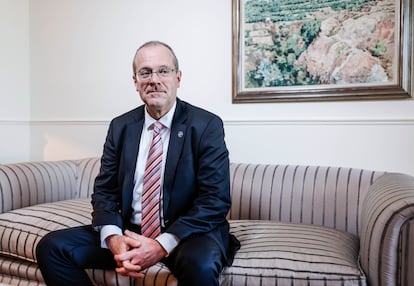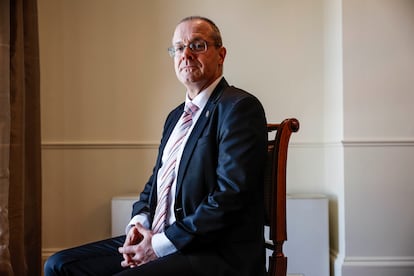Hans Kluge: ‘The next pandemic may be just around the corner. We must be prepared for the unexpected’
The regional director of WHO Europe discusses what was learned from the Covid-19 health emergency, and what can be done to address falling vaccination rates and rising numbers of STIs

When the coronavirus began to hit Europe in February 2020, Hans Kluge, 55, took office as the World Health Organization’s (WHO) regional director for Europe. After a few turbulent years due to the pandemic, he still has a lot of work ahead of him: the shortage in health professionals, the humanitarian catastrophes due to wars, the drop in vaccination rates, antimicrobial resistance, preventing future pandemics... Last week he was in Spain to reach an agreement with the government for the care of Gazan children with serious health problems and to participate in a primary healthcare forum led by the Spanish Ministry of Health, where he spoke with EL PAÍS.
Question. Spain will initially welcome 29 Gazan children with cancer and other serious health problems. What more can European countries and the WHO do for the health of Palestinians?
Answer. The most urgent thing is to evacuate the children who have no chance of surviving if they are not evacuated. We have asked Israel to allow the evacuation of these children, because both Spain and my country, Belgium, as well as France and Ireland, are willing to take them in. Beyond this, what’s most important is a permanent ceasefire to be able to bring in humanitarian aid, as well as the release of the hostages.
Q. At the moment, this is more of a palliative solution.
A. Yes, it is not a definitive solution, but imagine that it is your daughter who needs that help. Palestine has applied to the EU civil protection mechanism for 9,000 patients. We are also in dialogue with Israel to relax restrictions. It has to be done, because 70% of the people who have died in Palestine are women and children, and that alone is a reason to stop the war immediately. We have to start working on reconstruction plans to provide medical help as soon as possible
Q. What did we learn from the Covid-19 pandemic?
A. There are so many lessons, but maybe the big one is that countries have to learn to work on what they call dual track. It means we’re living in a permanent crisis. These crises are going to continue. I mean, Gaza, Ukraine, the next pandemic may be right around the corner. This means that our system has to go on dual track to manage the unexpected. But at the same time, it is very important to ensure daily basic essential health services, which we didn’t do in the pandemic. We have 1.2 million children in our region who did not get vaccinated against polio. Measles has multiplied by 40 compared to last year; it is completely unacceptable. And in lockdowns, we have to do better with mental health, especially in young people. We have to learn the lesson here. One in six people in our region has a mental health issue. And the best way to address them is primary healthcare.
Q. Has the WHO been self-critical of its management of the pandemic?
A. The WHO has saved millions of lives, that is a fact. However, we still need to learn to better manage fake news. For example, Dr. Anthony Fauci estimates that about 700,000 deaths in the United States were directly due to fake news that discouraged people from getting vaccinated.
Q. Are we better prepared for a new pandemic?
A. At the very last moment of the World Health Assembly last Saturday, just before midnight, there was very good news: the 194 member states proved that they can still reach agreements on controversial issues, such as the revision of international health regulations. Although the pandemic treaty was not approved [there was no agreement between the countries and the initiative failed], these regulations cover improved surveillance, timely sharing of information and access to medical countermeasures.

Q. Avian flu is rising uncontrollably, and some experts believe it may cause the next great pandemic. What is the WHO doing to prevent it?
A. We are absolutely concerned. We launched the Pan-European Network of Disease Control. Although we have the ECDC in Stockholm for 27 countries, we now have a network covering 53. This is a big step forward since Covid-19. Now we have a network that combines all countries and one of the first measures, directly related to your question, is to strengthen and share surveillance data, including wastewater surveillance.
Q. You mentioned the problem of vaccinations, which are falling across the continent. What can be done to solve this?
A. We must work on two tracks. The most important is what we call catch-up campaigns so that the countries where they have fallen catch up. And then others, such as those in Portugal and Spain, where education about vaccines and healthy lifestyles is already included in primary school curricula. When I became regional director, even if I’m a medical doctor myself, I saw that we’re a bit over-medicalized. We didn’t have anthropologists or sociologists. I learned this from my time working as a doctor with Doctors Without Borders in Liberia, during the Ebola outbreak, where I saw mothers attacking health workers because they forbade them from touching their deceased children, which for them, is culturally important before their children “go to heaven.” So we are using anthropologists and sociologists to understand what causes vaccine rejection. Real anti-vaxxers are a very small percentage. It’s mainly people who do not have the right information or cannot afford to travel to receive it. As for the real anti-vaxxers, there is honestly very little we can do.
Q. Another problem is the rise of sexually-transmitted infections.
A. It is very important to work with trusted community messengers, such as a Real Madrid soccer player or a tennis player. My daughters, for example, wore masks not because their father, director of the WHO in Europe, told them to, but because their idols in basketball and volleyball were doing this. Furthermore, it is essential to increase awareness within the health system itself, since in some countries health workers think that these are diseases of the past. We are also concerned about the backlash related to LGBTQ+ issues, sexual health and safe abortion, both outside and within the EU.
Q. In this sense, are you concerned about the rise of the extreme right?
A. Let’s say that I am concerned about the backlash in the universality that health is a human right for everyone, independent of ethnicity, sexual orientation or financial means. This is worrying, especially when looking at the situation in the region. However, at the World Health Assembly, I participated in a meeting with the health ministers of the BRICS Plus countries, where it was highlighted that each country has different traditions and cultures. I did not observe any country in the Assembly that doubted that men and women have equal rights, but neither can we enforce the same lexicon and terminology on each country. We have to recognize the different situations and find ways and means to achieve the goal, which is that health service is a human right for everyone.
Sign up for our weekly newsletter to get more English-language news coverage from EL PAÍS USA Edition
Tu suscripción se está usando en otro dispositivo
¿Quieres añadir otro usuario a tu suscripción?
Si continúas leyendo en este dispositivo, no se podrá leer en el otro.
FlechaTu suscripción se está usando en otro dispositivo y solo puedes acceder a EL PAÍS desde un dispositivo a la vez.
Si quieres compartir tu cuenta, cambia tu suscripción a la modalidad Premium, así podrás añadir otro usuario. Cada uno accederá con su propia cuenta de email, lo que os permitirá personalizar vuestra experiencia en EL PAÍS.
¿Tienes una suscripción de empresa? Accede aquí para contratar más cuentas.
En el caso de no saber quién está usando tu cuenta, te recomendamos cambiar tu contraseña aquí.
Si decides continuar compartiendo tu cuenta, este mensaje se mostrará en tu dispositivo y en el de la otra persona que está usando tu cuenta de forma indefinida, afectando a tu experiencia de lectura. Puedes consultar aquí los términos y condiciones de la suscripción digital.









































